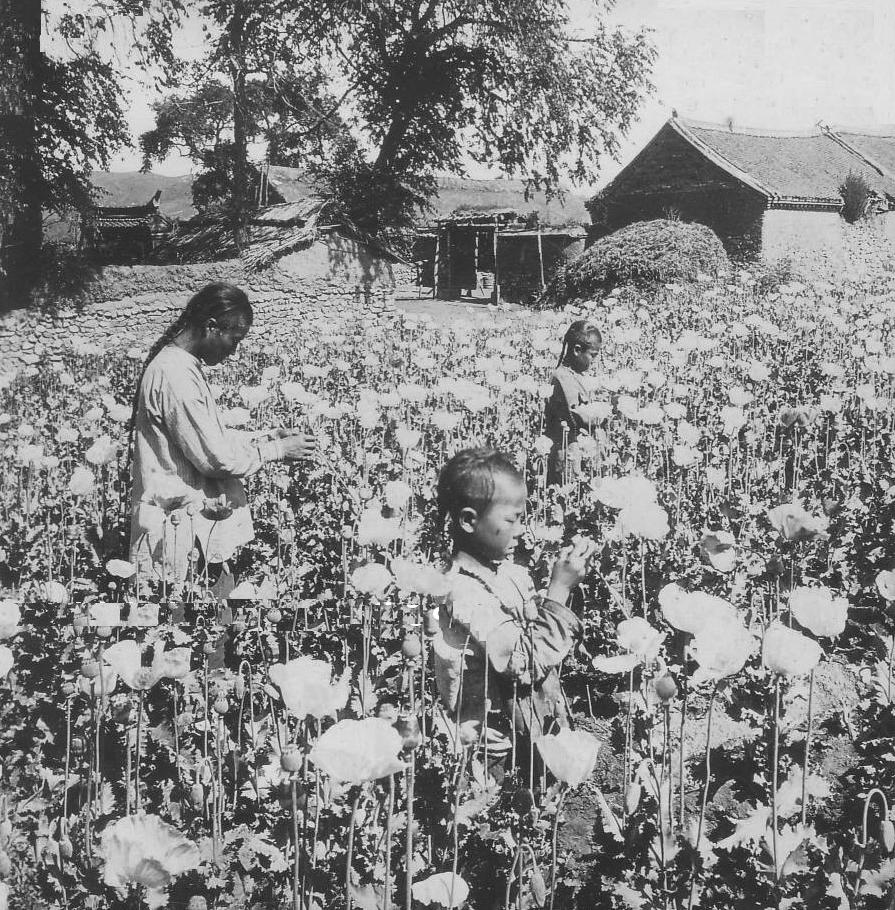
Chinese Economy: Colonial Era

Figure 1.--This 1903 steroscope was captioned, "8640. A Poppy field in Manchuria, natives extracting fluid from which opium is made." Source: M.C. White Co. We are not sure about the circumstances here. The opium is clearly being grown openly. The Imperial Government attempted to restrict the sale of opium in China, resulting in the Opium Wars. We are not sure if the Government had given up on restricting opium or if this is a refkection of the decliing control of the Government over Manchuria.
|
|
China was never colonized by the West, but it was powefully affected by the European powers, but not at first. The whole purpose of the West's maritime outreach was to reach the East, epecially China. China at the time was the world's largest and most prosperous country (16th cebntury). Products like porselin and sikk were highly prized in the West. The first Western traders reached China during Ming Dynasty.
A period of political instability began caused by wars resulting in the overthrow of the Ming (1640s).
Qing (Manchu) Dynasty gained control of China. They entered Beijing (1644). It took longer to seize contol of the south, several decades in fact. It was a time of great suffering in China (1640s-50s). There are reports of starvation and epedemics which affected the population.
It was during the Qing Dynasty that foreign food crops like the potato and corn were introduced on a large scale in China (especially during the 18th century). These new crops and the bountiful crops they producd as well
the peace of Qing rule resulted in a substantial increase in population. China's popultion during the Ming was something like 150–200 million, but this grew to more than 400 million during the Qing era. [Fairbank, p. 191.] Markets expanded with the growth of population (18th century). The Qing reduced taxation levels helping to expand market activity. The Corvée system was replaced with a head tax used to hire workers. China continued to export tea, silk, porcelin abd other manufactures goods. Western merchants struggled to find products they could sell to the Chinese. Western silb=ver helped settle the adverse trade balance. [Murphey, p. 151.] A major difference between Ming and Qing economic policy was that the Qing involved itself significantly in the economy. interfered greatly in the economy.
As a result of the Industrial Revolution in Europe, by the 19th century China had declined to a backward country unable to defend itself from more technicall advanced foreign powers. China was never converted to a colony. The Europeans generally confined their commercial activities to coastal cities. While not a colony, the combination of coastal enclaves and unequal treatries converted China to a kind of colonial dependency.
CIH

Navigate the Children in History Website:
[Return to the Main Chinese economy page]
[Return to the Main Chinese page]
[Return to the Main Asian economics page]
[Return to the Main economics country page]
[Return to the Main Economics page]
[Introduction]
[Animals]
[Biographies]
[Chronology]
[Climatology]
[Clothing]
[Disease and Health]
[Economics]
[Ethnicity]
[Geography]
[History]
[Human Nature]
[Law]
[Nationalism]
[Presidents]
[Religion]
[Royalty]
[Science]
[Social Class]
[Bibliographies]
[Contributions]
[FAQs]
[Glossaries]
[Images]
[Links]
[Registration]
[Tools]
[Children in History Home]
Created: 8:47 PM 7/27/2013
Last updated: 8:47 PM 7/27/2013



